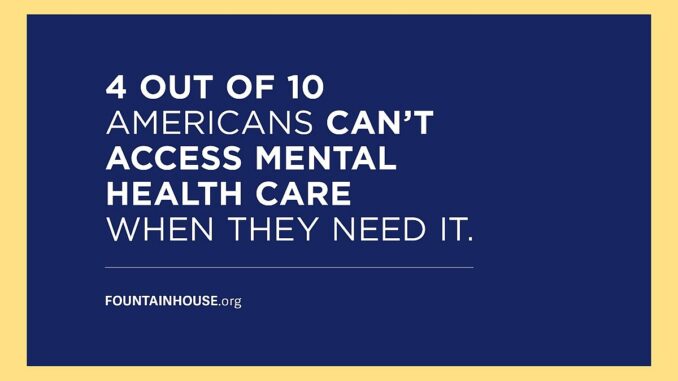Sue Harris is a psychologist who has worked in psychiatric hospitals and group homes and has been in private practice since 1968. She is co-author of “Interpersonal Psychoanalytic Theory for the 21st Century: Evolving Self,” published by Lexington Books, an imprint of Rowman and Littlefield.

Fountain House
Two hundred years ago, people with serious mental illness (SMI) were often placed in prison because society didn’t know how to care for them. After reformers fought for more humane treatment for the mentally ill, their care moved to mental institutions in the 1800s. However, these large mental asylums were often overcrowded and underfunded. They resembled prisons and employed methods of treatment that seemed more like punishment, such as restraints, isolation, lobotomies and electric or insulin shock therapy.
By the 1960s, new medications became available to control symptoms of SMI to make patients more manageable. States started to close their mental institutions. Many people believed that people with SMI would have better outcomes if they were treated in community mental health programs instead of hospitals.
Hospitals began to empty out, discharging their long-term patients, who were now heavily medicated, to local community mental health clinics and to their families. Many local health clinics began to spring up, but sufficient funding was not always available, and often families were not able to manage their still very disturbed family members. By the late 20th century, people with SMI increasingly ended up in prisons. (Stefanie Watson, “Schizophrenics in Prison,” 2022, WebMD)
From surveys conducted earlier: “In 44 states, a jail or prison holds more mentally ill individuals than the largest remaining state psychiatric hospital; in every county in the United States with both a county jail and a county psychiatric facility, more seriously mentally ill individuals are incarcerated than hospitalized.” (A 2014 joint report on treatmentadvocacycenter.com)
Imprisoned people with SMI who are unable to follow prison rules often are placed in solitary confinement. Isolation for a seriously disturbed person can and often does lead to suicide. Statistics show that is, in fact, occurring. Suicide is the leading cause of death in correctional facilities, and multiple studies indicate as many as half of all inmate suicides are committed by the estimated 15% to 20% of inmates with serious mental illness.
In prisons in the U.S., prisoners with SMI are held longer and cost more to maintain than other prisoners, due to medication requirements and management issues. They also are more likely to be imprisoned again after release. There are examples of better outcomes.
Treatment centers that provide opportunities for socialization and creativity, providing therapy and a sense of belonging tend to have better results, as described by leading psychiatrists Harry Stack Sullivan and Frieda Fromm-Reichman*, who had very promising results with seriously disturbed patients at Shephard & Enoch Pratt and Chestnut Lodge in the 1940s and 1950s.
More recently, programs that stress “caring relationships” and provision for re-entry into the community also reduce the rate of those returned to prison. Such programs, however, are rare. When government-supported health care was thriving in Europe, there were halfway houses available that created therapeutic communities that produced better outcomes as long as people remained within them.
Under capitalist for-profit health care, such treatment is affordable by very few people, and is not available to most people suffering from SMI. With the depopulation of the old-fashioned mental hospital, most patients return to the family or the streets and are repeatedly re-hospitalized for short periods until they end up in prison or die on the street. There is no supportive place for them in capitalist society.
Socialist Cuba’s humane mental health care system
In socialist Cuba, it is a different story. There are enough doctors, nurses and other medical workers, psychiatrists and psychologists to cover the entire Cuban population. “The physician to citizen ratio in Cuba is the world’s highest, with 8 physicians to every 1,000 citizens, more than double the ratio of physicians to citizens in the U.S. (Gonzalez Mendez, 2005; Campion & Morrissey, 2015)
In Cuba, “Mental and medical healthcare are free and fully integrated. Early diagnosis and intervention are standard, as each patient is known by their community doctor/nurse team from infancy through old age and by yearly home visits.” (“Learning about mental healthcare in today’s Cuba: An interview with the president of the Cuban society of psychology,” — Linz, Sheila J & Ruiz, Alexis Lorenzo, 2020)
If informed by a family member of a psychiatric problem, an intervention in Cuba can occur early before the mental health problem becomes a crisis. Doctors and nurses have established relationships with their patients, and usually live in the same community with government-supported, rent-free housing to foster long-standing relationships (“Briefing on the Cuban Mental Health System,” Jeffrey Kleinberg, 2018).
If the profit motive is removed, a “cure” for the dreaded mental ‘diseases’ of schizophrenia, paranoia, bipolar disorder or any of the diagnoses contained under the rubric of SMI is relatively simple and effective, as is demonstrated in Cuba. This occurs despite the crippling sanctions imposed by the United States.
*Sullivan and Fromm-Reichman are co-founders of the William Alanson White Institute; Sullivan founded the journal, “Psychiatry,” in 1937 and authored a series of books on psychiatry published by Norton press in the mid-20th century, including “Interpersonal theory of Psychiatry and Schizophrenia as a Human Process.” Fromm-Reichman authored “Principles of Intensive Psychotherapy” in 1950.
